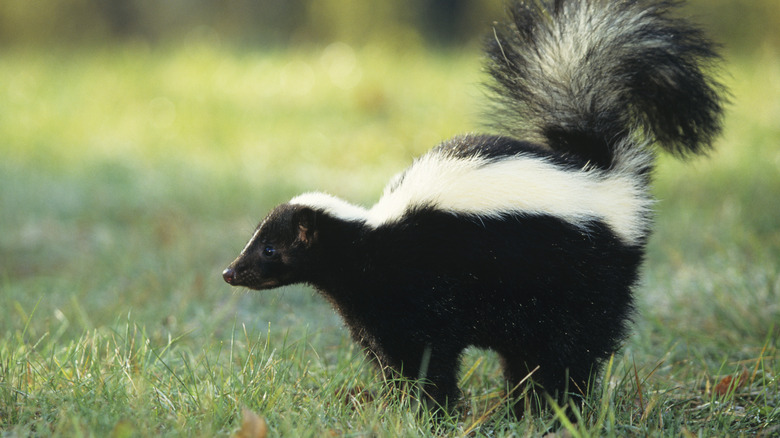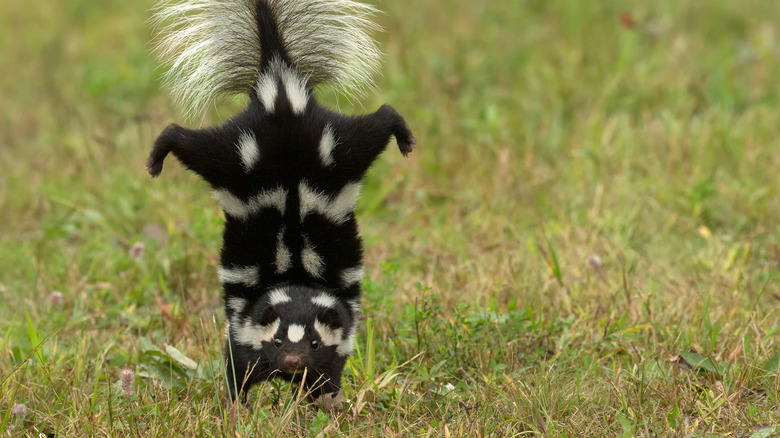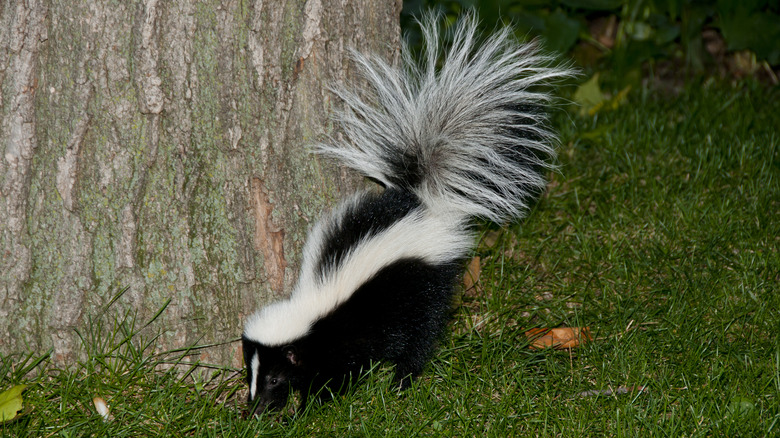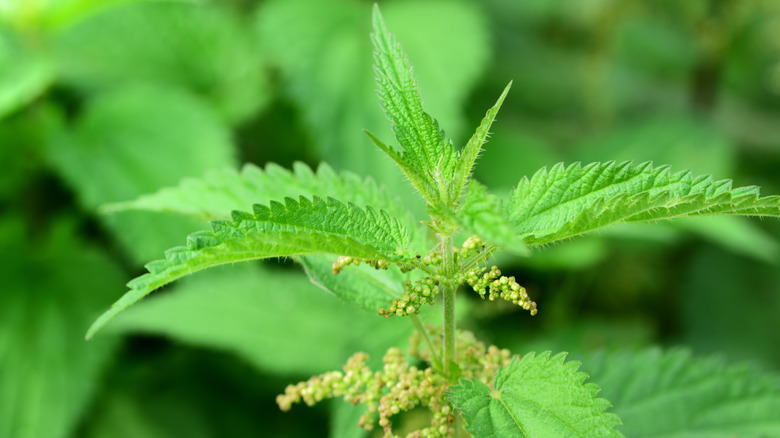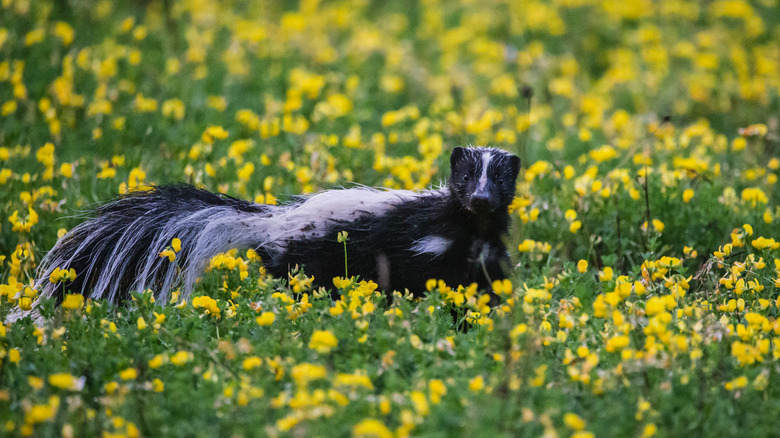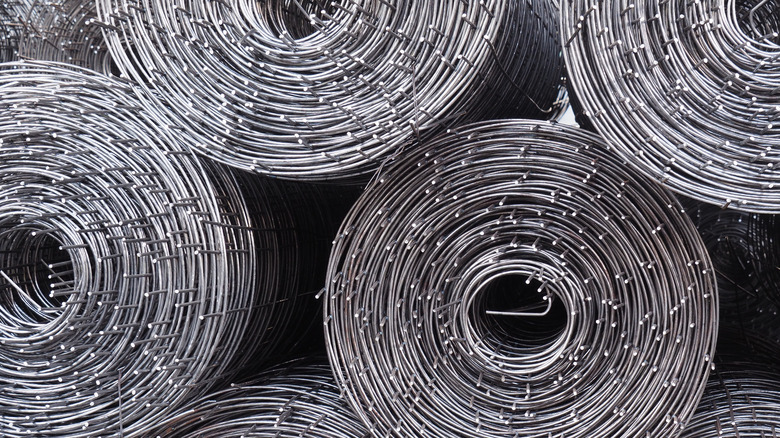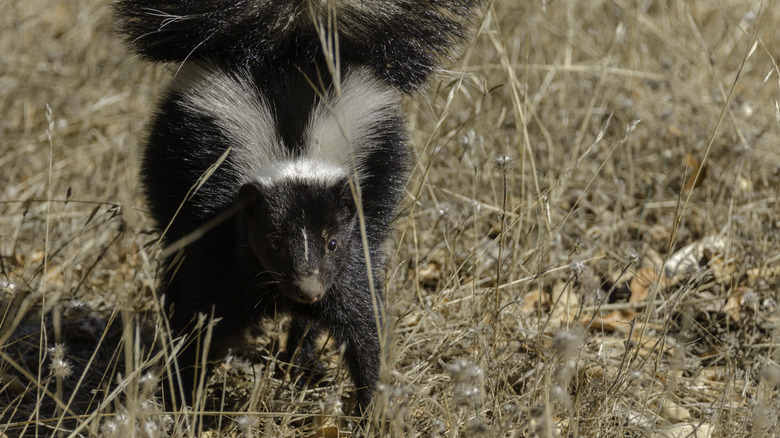Can You Use Plants To Keep Skunks Out Of Your Garden? An Expert Weighs In
You've put in a lot of work to get your garden thriving this year. Perhaps you've fenced it in to keep the deer out. It's doing well, but suddenly, there seems to be a new threat. Something is digging around in the dirt, tearing up the soil and roots as they go — It could be skunks. They tend to have many of the same tendencies as squirrels in that they dig small holes in search of grubs. You may also notice the lower stems of your plants look like something has ripped off all of the young leaves, too. While you may initially blame groundhogs or even rabbits, skunks can be a problematic garden nuisance in their own right.
For the holistic gardener, it can seem difficult to keep skunks out of your yard without the use of chemicals. However, in an exclusive interview with House Digest, Dr. Charles van Rees, a professional naturalist and conservation biologist at Gulo in Nature, shares some natural methods for safeguarding your garden that could resolve your problems for good.
Skunks belong to a tenacious family
Most people know skunks for the pungent smell they use as a tactical weapon to defend against predators. To learn how to protect your yard, lawn, and garden, you'll need to get to know what's behind these critters a bit more fully. Dr. van Rees shares, "skunks belong to a mammalian family called the Mustelidae. Other members of this family are weasels, ferrets, stoats, and wolverines. What do these all have in common? They are intensely tenacious, tough, never-back-down animals."
Working to keep them out of your yard is often a primary goal since they can create a significant amount of damage and limit vegetable production. You may opt to use plants to do this, but the question is, what can give you a fighting chance? Dr. van Rees warns "if a musteline wants something in your yard, some flowers just isn't gonna stop it. This goes for skunks too, even if they are admittedly fluffier, chunkier, clumsier, and goofier than their more bloodthirsty cousins. Skunks are excellent diggers and good at fitting between tight spaces if they need to."
What the science says
If you have a skunk problem, you may be willing to try everything on the internet to help get rid of them. However, Dr. van Rees notes that there isn't much solid advice out there, "Interestingly, most of the advice on the internet for keeping skunks out of your yard have to do with what herbs or shrubs you should plant to keep them away."
He continues, "People recommend everything from stinging nettles that would be uncomfortable for a skunk's sensitive nose to prickly squash vines that are hard for them to traverse with short legs. Other sources make a lot of wild claims about flowers whose scent will drive skunks away. But does this hold any water?" While some of these solutions may seem to be promising, Dr. van Rees states "I can't find any evidence of this in the scientific literature, and chatting with fellow biologists has turned up very little. In other words, there is reason to be skeptical here."
What about stinging nettle?
Stinging nettle, which has fine hairs on its stems and along the leaves that have a natural irritation-causing chemical, is a commonly recommended solution to keep skunks out of the garden. Dr. van Rees refutes this saying, "Nettle grows wild in many natural environments, and doesn't seem to stop animals from moving through it, sensitive noses or not. The same goes for thorny and spiky plants, although they might slow down larger animals."
In addition, these types of plants are not the most beautiful choices for our gardens. Dr. van Rees observes that "none of the online guides recommending nettle ever seems to mention, either, that stinging nettle hurts us too, so you want to plant it judiciously. It can really hurt if you fall in it or accidentally set your hand in it. It's not recommended for households with kids." However, if you decide to plant it, keep it out of pathways and tend to it routinely to keep it from branching out and spreading into the garden. That will make pruning more challenging for you.
Will the scent of certain flowers repel skunks?
Scent is another natural defense mechanism some plants have to discourage foulage munching. There may be some scents these critters don't like, such as citrus, but whether or not flowers will help isn't a sure science. "I can find no reliable evidence of this. I think it will ultimately depend on how badly a skunk wants to get into your yard," Dr. van Rees states.
Dr. van Rees then goes on to explain how the habits of a skunk make them so difficult to eradicate. "It's important to remember that backyards are not isolated; wildlife does not see the fence lines separating your yard from others in your neighborhood. They exist as one relatively continuous suburban landscape for wildlife," he says.
That also provides some insight into why your yard may be their target. "Skunks will move between yards to get what they need to live; if your yard offers something that other yards don't (food, shelter, etc.), you can bet your bottom dollar they're going to be motivated to access it. Skunks are relatively powerful little critters with a big appetite for grubs, large insects, and other pests." Unfortunately, those insects, like worms, that are helping to build pathways for plant roots to grow are a tempting snack and likely an easy-to-get-to resource for skunks.
A better way to repel skunks
The answer could be an even easier solution than having to buy, plant, and maintain skunk-deterring plants, according to Dr. van Rees. "A much better way to avoid having skunks around is to avoid providing them with food: Clean up trash, secure your compost pile, and avoid cultivars of grass in your lawn that tend to attract beetle grubs." These animals will always go to the easiest food source for them. Let your neighbor's trash be more appealing than your yard.
Alternatively, "a solid physical barrier like a fence or a tall flowerbed wall would be effective, so long as it was gap-free and sufficiently high," shares Dr. van Rees. Most home improvement stores sell woven wire and mesh fences with no more than one-inch openings that help prevent them from wiggling through.
Don't stop there, says Dr. van Rees, "look up videos of skunks climbing on YouTube — not exactly graceful! Their clumsy nature and squat stature make it very energy-intensive for them, so they'd need to be very motivated to climb a high wall. I've even found videos of pet skunks having trouble climbing up onto a bed from the ground." Aim to bury the fence about six inches into the ground and extend it as high as possible to prevent climbing over.
Skunks are actually beneficial
If all else fails, perhaps it's time for a change of perspective. "It may be worth considering why we're so desperate to keep skunks away in the first place. What are they digging for in your perfectly manicured lawn? Probably buried wasps nests that could make a nasty surprise for your family or pets, or beetle grubs that are chowing down on your precious turf grass," shares Dr. van Rees. If you're not using any type of chemical-based weeding application, there is likely an overabundance of pests in your yard that could be attracting them. Consider a natural deterrent for insects.
But what about your garden and your hopes for homegrown vegetables? "The same goes for any of their nocturnal excavations in flower or vegetable beds. As voracious bug-eaters, skunks are pretty phenomenal pest control," he shares. If they are doing significant plant damage, consider the application of ammonia-soaked cotton balls. Castor oil can help deter skunks, too. Predator urine, found at many garden centers, could also help, especially if it's from coyotes, or having a dog around the home can also help to make your yard less desirable.
